
If you’re looking to start a blog, you may be wondering which platform to choose. While there are many options available, open source blogging platforms offer a number of advantages. Not only are they often free to use, but they also give you greater control over your blog’s design and functionality.
Open source software is free to use, modify, and distribute, which means you can customize your blog to your exact specifications without having to pay for expensive licenses or subscriptions. In this article, we’ll look at some of the best open source blogging platforms available.
1. WordPress.org
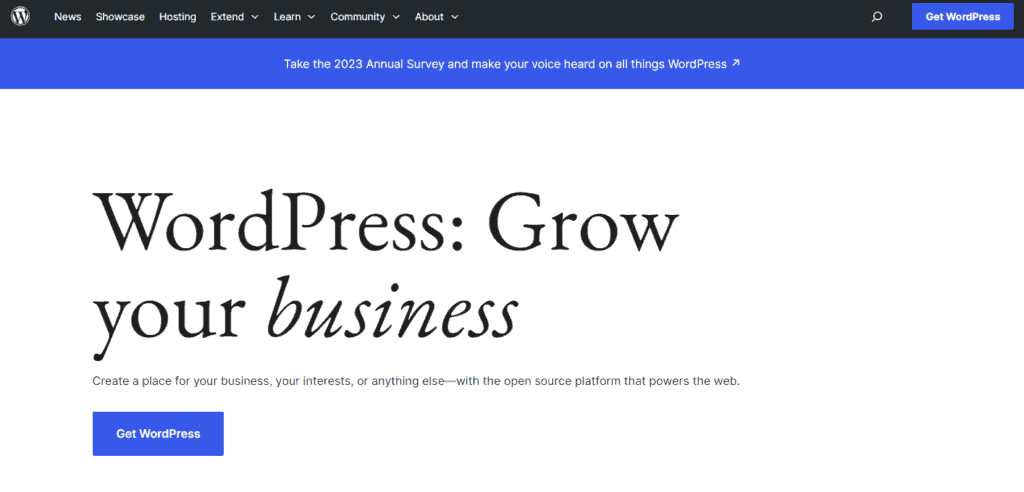
WordPress.org is one of the most popular open source blogging platforms available. It is a free and self-hosted content management system (CMS) that powers over 40% of all websites on the internet. WordPress.org has a vast community of developers and users who contribute to its development and support.
Pros
- Ease of Use: WordPress.org is very easy to use, even for beginners. Its user-friendly interface allows you to create and manage your blog without any coding knowledge. You can customize your site with various themes and plugins, which are easy to install and use.
- Customization: WordPress.org provides a wide range of customization options. You can choose from thousands of free and paid themes and plugins to add functionality and design to your blog. You can also customize your site’s layout, fonts, colors, and more.
- SEO Friendly: WordPress.org is built with SEO in mind. It has built-in SEO features that help you optimize your content for search engines. You can also use various plugins to improve your site’s SEO.
- Large Community: WordPress.org has a vast community of developers and users who contribute to its development and support. You can find help and resources from the community forums, documentation, and tutorials.
Cons
- Hosting: WordPress.org requires you to have your own hosting and domain name. This can be a bit overwhelming for beginners who are not familiar with web hosting.
- Learning Curve: Although WordPress.org is easy to use, there is still a learning curve involved. You need to learn how to use the platform, install and customize themes and plugins, and manage your site’s security and updates.
Overall, WordPress.org is a great open source blogging platform that provides a wide range of customization options and features.
2. Ghost
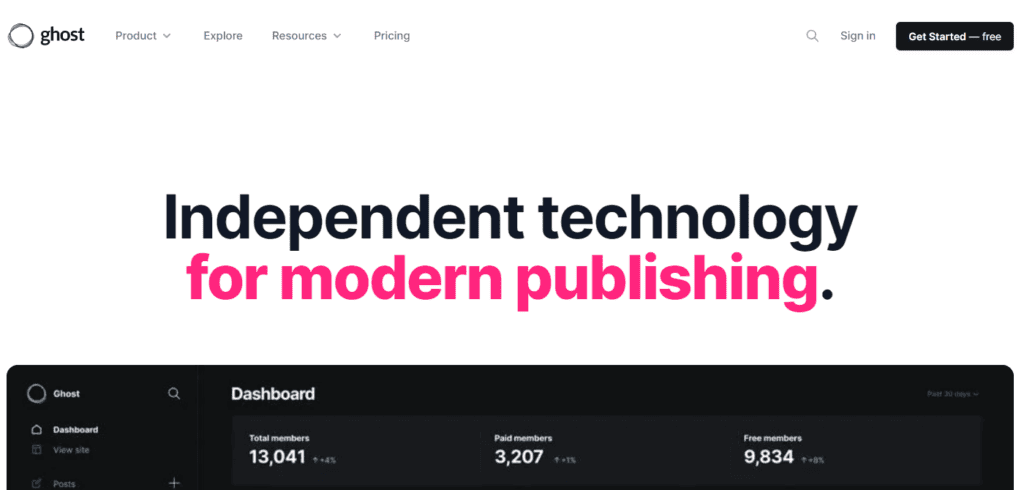
Ghost is a modern and minimalist open-source blogging platform that focuses on simplicity and speed. It offers a clean and intuitive interface, making it easy to write and publish your blog posts. Ghost is a great option for those who want to focus on content creation without getting bogged down with complicated features.
Pros
- Simplicity: Ghost’s minimalist design makes it easy to use and navigate, allowing you to focus on creating content.
- Speed: Ghost is optimized for speed, which means your blog will load quickly, providing a better user experience for your readers.
- Customization: Ghost offers a variety of themes and plugins to customize your blog’s design and functionality.
- Membership and Subscription: Ghost offers built-in membership and subscription features, allowing you to monetize your content and build a community around your blog.
Cons
- Limited Features: Ghost’s minimalist design means that it may not have all the features that some bloggers are looking for.
- Pricing: While Ghost is open-source, hosting and maintenance can be costly. Ghost offers a managed hosting service, which starts at $29/month for the basic plan.
Overall, Ghost is a great option for bloggers who value simplicity, speed, and customization. However, if you require more advanced features, you may want to consider other options.
3. Jekyll
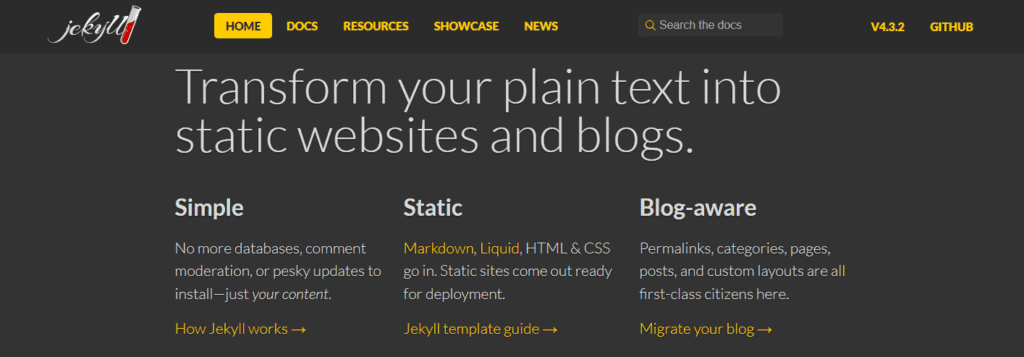
Jekyll is a simple, blog-aware, static site generator that allows you to transform your plain text into static sites ready for deployment. It is a popular open-source blogging platform that is used by developers, bloggers, and designers to create fast, secure, and easy-to-manage websites.
Pros
- Easy to use: Jekyll is a beginner-friendly platform that requires no prior knowledge of coding or web development. It provides a user-friendly interface that allows you to create and manage your website with ease.
- Fast and secure: Jekyll generates static HTML pages, which makes your website faster and more secure than dynamic websites. It also eliminates the need for a database, which reduces the risk of security breaches and improves website speed.
- Customizable: Jekyll offers a wide range of templates, themes, and plugins that allow you to customize your website to suit your unique style and requirements. It also supports Markdown, HTML, and Liquid, which provides you with more flexibility and control over your website’s design and content.
Cons
- Limited functionality: Jekyll is a static site generator, which means it has limited functionality compared to dynamic websites. It does not support advanced features like user registration, comments, and search functionality, which may be important for some bloggers.
- Requires technical knowledge: Although Jekyll is easy to use for beginners, it still requires some technical knowledge of web development and command line tools. This may be a barrier for some users who are not familiar with these concepts.
Overall, Jekyll is a great open-source blogging platform for developers, bloggers, and designers who are looking for a fast, secure, and easy-to-manage website.
4. Joomla

Joomla is a popular open-source CMS that can be used for blogging. It has a user-friendly interface and offers a wide range of features and customization options. Here are some pros and cons of using Joomla for blogging:
Pros
- Versatility: Joomla is a versatile platform that can be used for a variety of purposes, including blogging. It offers a wide range of templates and extensions that can be used to customize your blog and make it stand out.
- Ease of use: Joomla has a user-friendly interface that makes it easy to create and manage blog content. It also offers a range of tools and features that can help you optimize your content for search engines.
- Community support: Joomla has a large and active community of users and developers who provide support, resources, and guidance. This can be especially helpful if you’re new to blogging or the Joomla platform.
- Security: Joomla is known for its strong security features, which can help protect your blog from malware, hacking, and other security threats.
Cons
- Learning curve: Joomla can be more difficult to learn and use than some other blogging platforms, especially if you’re not familiar with CMS systems. It may take some time to get used to the platform and its features.
- Plugins can be expensive: Some Joomla plugins and extensions can be expensive to purchase, which can add to the overall cost of running your blog.
Overall, Joomla is a solid choice for bloggers who want a versatile and customizable platform with strong security features and a supportive community.
5. Drupal
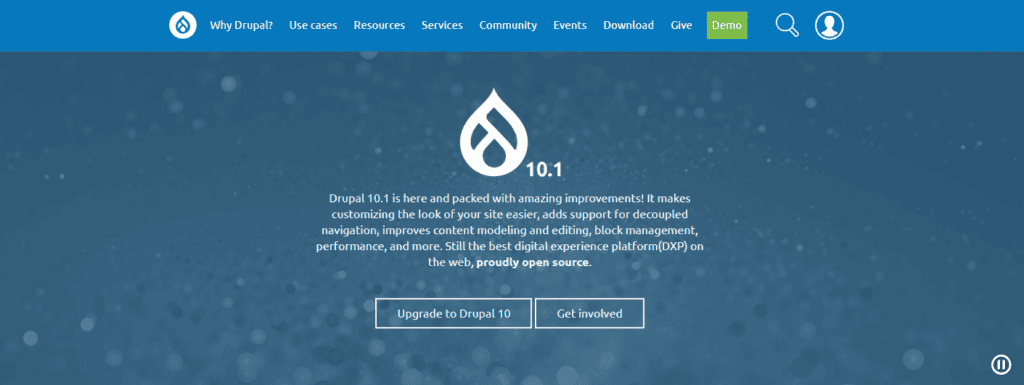
If you’re looking for an open-source blogging platform that is highly customizable, Drupal is a great option. Drupal is a content management system (CMS) that is known for its flexibility, scalability, and security. It’s a great choice for bloggers who want to create a unique website that stands out from the crowd.
Pros
- Customization: Drupal is highly customizable, which means you can create a blog that looks and functions exactly the way you want it to. There are thousands of free and paid themes and modules available that you can use to add features and functionality to your blog.
- Scalability: Drupal is designed to handle websites of all sizes, from small blogs to large enterprise sites. This means that as your blog grows, Drupal can grow with it.
- Security: Drupal is known for its strong security features, which makes it a great choice for bloggers who are concerned about the safety of their website and their readers.
- Community: Drupal has a large and active community of developers and users who are constantly working to improve the platform. This means that there is always someone to turn to if you need help or advice.
Cons
- Learning Curve: Drupal can be more difficult to learn than other blogging platforms, especially if you don’t have any experience with CMSs. However, there are plenty of resources available online to help you get started.
- Maintenance: Because Drupal is highly customizable, it can require more maintenance than other blogging platforms. You’ll need to keep up with updates and security patches to ensure that your website is secure and functioning properly.
Overall, Drupal is a great choice for bloggers who want a highly customizable and scalable platform. While it may require more maintenance than other platforms, the benefits of customization and security make it a worthwhile investment.
5. Pelican
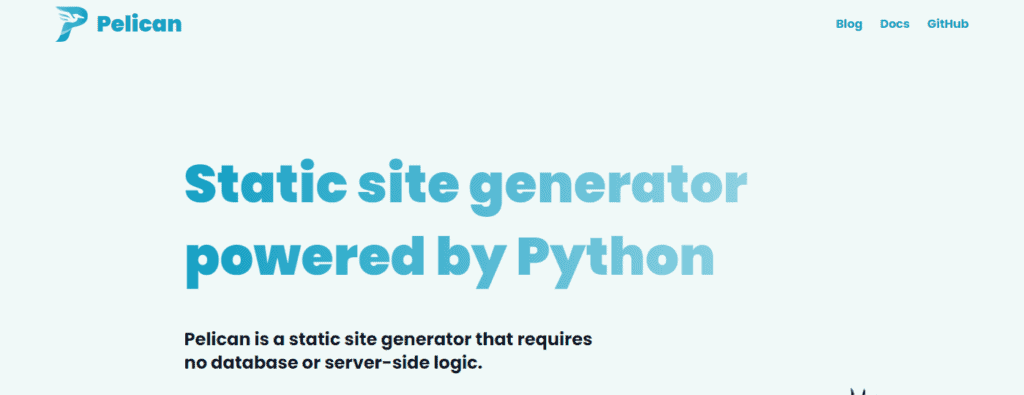
Pelican is a static site generator that is perfect for creating blogs. It is written in Python and is easy to install and use. Here are some of the pros and cons of using Pelican:
Pros
- Speed: Pelican generates static HTML files, which makes it incredibly fast. This means that your blog will load quickly, which is important for keeping readers engaged.
- Security: Since Pelican generates static files, there is no need for a database. This means that there are fewer security risks associated with using Pelican.
- Flexibility: Pelican is highly customizable, and you can use it to create a blog that suits your needs. You can choose from a variety of themes and plugins to customize your blog’s appearance and functionality.
Cons
- Limited Functionality: Pelican is a static site generator, which means that it has limited functionality compared to other open source blogging platforms. For example, you cannot create dynamic content or use a database.
- Less Support: Pelican has a smaller community compared to other open source blogging platforms, which means that there are fewer resources available if you need help.
Overall, Pelican is a great open source blogging platform for those who want a fast, secure, and customizable blog. While there is a learning curve, Pelican’s flexibility and speed make it a great choice for many bloggers.
6. Bolt
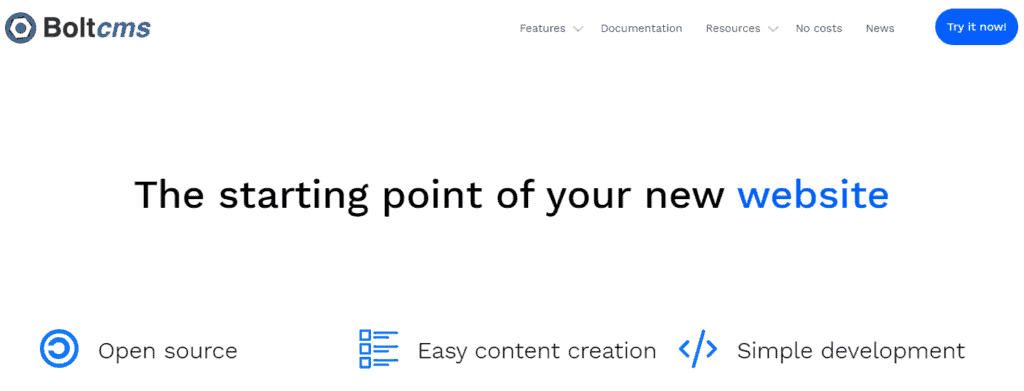
Bolt is a lightweight and user-friendly open source CMS that is perfect for bloggers who want a simple and easy-to-use platform. It offers a range of features that make it a great choice for bloggers of all levels.
Pros
- Easy to learn: Bolt is easy to install and set up, even for beginners. You don’t need any coding skills to get started with Bolt.
- Flexible: Bolt is highly customizable, with a range of themes and plugins available to help you create the perfect blog for your needs.
- Optimized for speed: Bolt is lightweight and fast, which means that your blog will load quickly and be easy to navigate for your readers.
- Great for beginners: Bolt has a user-friendly interface that makes it easy to create and publish blog posts, even if you have no experience with content management systems.
Cons
- Limited customization: Bolt’s range of themes and plugins is not as extensive as some other open source blogging platforms, which may limit your options if you are looking for a specific feature or design element.
- Learning curve: Bolt’s user interface can be a bit overwhelming at first, especially if you are new to content management systems.
Overall, Bolt is a great choice for bloggers who want a simple and easy-to-use platform that is highly customizable and fast-loading. While it may not have as many resources available as some other open source blogging platforms, it is still a solid choice for bloggers of all levels.
Conclusion
In conclusion, there are many open source blogging platforms available that offer a range of features and customization options. WordPress remains the most popular choice, with a large community of users and developers, but there are also newer platforms like Ghost that offer unique benefits.
When choosing a platform, it’s important to consider your specific needs and goals for your blog. Some key factors to consider include ease of use, flexibility, customization options, and community support.
Ultimately, the best open source blogging platform for you will depend on your individual needs and preferences. By doing research and considering your options carefully, you can find a platform that meets your needs and helps you achieve your blogging goals.
Frequently Asked Questions
What are the best open source blogging platforms?
There are several open source blogging platforms available, but some of the best ones include WordPress, Ghost, and Drupal. WordPress is the most popular open source platform and offers a wide range of features and plugins. Ghost is a newer platform that focuses on simplicity and speed, while Drupal is a more complex platform that is suitable for larger websites.
What is the easiest free blog platform to use?
If you are looking for a free and easy-to-use blogging platform, then WordPress.com is a good option. Both platforms offer a simple interface and are easy to set up and use. However, they come with limitations in terms of customization and functionality.
Are there any self-hosted blogging platforms that are easy to set up?
Yes, there are several self-hosted blogging platforms that are easy to set up, including WordPress.org and Ghost. WordPress.org is the most popular self-hosted platform and offers a wide range of features and plugins. Ghost is a newer platform that focuses on simplicity and speed.
